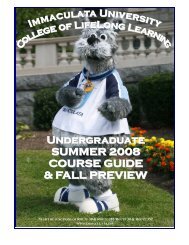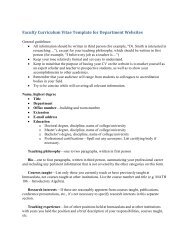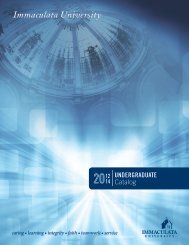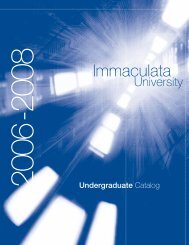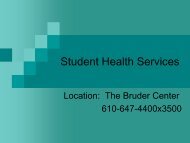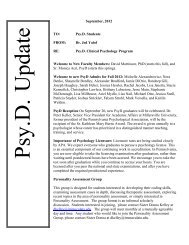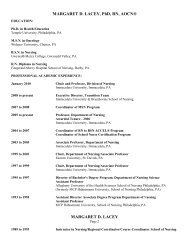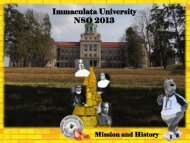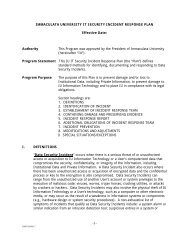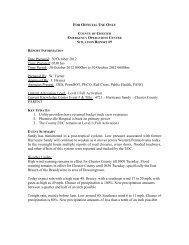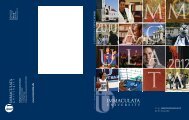Undergraduate Catalog 2008-2010 - Immaculata University
Undergraduate Catalog 2008-2010 - Immaculata University
Undergraduate Catalog 2008-2010 - Immaculata University
Create successful ePaper yourself
Turn your PDF publications into a flip-book with our unique Google optimized e-Paper software.
practical experience with these concepts. (Prerequisite: CIS 105<br />
and CIS 218 or instructor’s approval.<br />
CIS 230 Web Design (3)<br />
Students develop a solid understanding of the workings of, and<br />
the issues within, the Worldwide Web through this foundation web<br />
design course. Projects include conceptualizing, and implementing<br />
quality web page designs using contemporary tools and best practice<br />
techniques. (Competency in CIS 201 content is recommended.)<br />
CIS 231 The Basics of Networking (3)<br />
Basic technologies implemented in Local Area Networks and<br />
Wide Area Networks. Study of the OSI model and the essentials of<br />
network design and administration. Hands-on experience in<br />
configuring hardware and software for simple network connection.<br />
(Competency in CIS 201 content is recommended.)<br />
CIS 317 Computer Architecture (3)<br />
Computer structure, and systems, assembly and machine language,<br />
number systems and Boolean algebra. (Prerequisite: CIS 218)<br />
CIS 325 Systems Analysis & Design (3)<br />
An introduction to the systems development life cycle and the<br />
variety of strategies, tools and techniques of modern system<br />
development with an emphasis on the SWEBOK. (Prerequisite:<br />
CIS 105 and CIS 218 or instructor’s approval)<br />
CIS 326 Data Structures (3)<br />
Basic concepts of data organization. Topics include strings, lists,<br />
graphs, trees; file structures; searching and sorting techniques,<br />
applications. (Prerequisite: CIS 218 or instructor’s approval)<br />
CIS 327 Advanced Design & Programming (3)<br />
Advanced object-oriented concepts and programming techniques<br />
for designing and creating software applications. Common topics<br />
are classes, objects, inheritance, polymorphism and interface<br />
development. May also include other topics such as exception<br />
handling, design patterns, and dynamic containers. (Prerequisite:<br />
CIS 105 and CIS 218 or instructor’s approval)<br />
CIS 328 Artificial Intelligence (3)<br />
A general introduction to AI that allows students to explore this<br />
topic from both the technical and philosophical perspective. The<br />
underlying fundamental theories and representational structures in<br />
AI are covered. Students work with AI and survey current AI<br />
literature from both viewpoints. Students are challenged to consider<br />
consciousness, intelligence, robotics and implications for the future.<br />
(Prerequisite: Competency in CIS 201 content is recommended and<br />
PHI 209 or 309, or instructor’s approval). (See PHI 328)<br />
CIS 330 Advanced Topics in Robotics (3)<br />
Exploration of current social opportunities/issues and recent<br />
technical developments in robotics. Students will engage in the<br />
design and creation of mobile intelligent robotics at an advanced<br />
level. (Departmental approval required).<br />
CIS 331 Software Project Management (3)<br />
An introduction to software project management as it relates to<br />
software engineering. The course integrates theory with best<br />
practices. The major topics covered are: project scope, Capability<br />
Maturity Model (project planning and project tracking/oversight),<br />
estimation, scheduling, quality, risk management, organizational<br />
management, and team management. Students learn project<br />
management skills through both collaborative and individual<br />
projects designed to apply theory through practical application.<br />
(Prerequisites: CIS 218 and CIS 325)<br />
CIS 335 Technology and Ethical Issues (3)<br />
Issues driven by technology and information: validity, timeliness,<br />
freedom, limitations, privacy, access, intellectual property, copyright,<br />
intellectual integrity; communication law. (Competency in CIS 201<br />
content is recommended.) (Traditional and accelerated formats).<br />
CIS 401 CIS Topics or Internship (1-3)<br />
In depth study of selected topics in computer science on an<br />
individual or small group basis; or a for-credit, IT field Internship<br />
on an individual basis at the junior or senior level. (By prior<br />
arrangement with a member of the department).<br />
CIS 403 Object-Oriented Concepts (3)<br />
An introduction to object-oriented analysis and design. The<br />
course integrates theory with best practices. The course teaches<br />
object-oriented analysis and design using the Unified Modeling<br />
Language (UML). This course is relevant to software<br />
engineers/developers and business personnel who participate in the<br />
development of software applications. Students learn skills through<br />
both collaborative and individual projects designed to apply theory<br />
through practical application. (Prerequisites: CIS 218 and CIS 325)<br />
CIS 404 Human Computer Interaction (3)<br />
An introduction to the issues concerning computer and software<br />
application usefulness and usability. The course integrates theory<br />
with best practices. The course builds on the concepts and<br />
techniques presented in the system analysis and design course. This<br />
course integrates the knowledge and skills required to engineer<br />
usefulness and usability into the software development life cycle.<br />
This course is relevant to software engineers/developers as well as<br />
anyone who participates in the creation and evaluation of interactive<br />
software applications. Students learn skills through both<br />
collaborative and individual projects designed to apply theory<br />
through practical application. (Prerequisites: CIS 218 and CIS 325)<br />
CIS 405 Professional Internship (1 – 3)<br />
A limited-enrollment, mentored professional field experience in<br />
relevant areas of information technology. Students will apply for<br />
positions in industry or education that will offer hands-on field<br />
experience and enhance career readiness in a chosen area of IT.<br />
(By prior arrangement with a member of the department).<br />
CIS 406 Software Quality & Testing (3)<br />
An introduction to the processes, procedures, techniques, and<br />
best practices used to increase software product quality.<br />
(Prerequisites: CIS 218, CIS 224, CIS 325)<br />
CIS 408 Research Fundamentals (1-3)<br />
An introduction to researching a topic of interest in an advanced<br />
mathematics or computer related area chosen by the student in<br />
consultation with the instructor. (See Math 408) (Prerequisite: CIS<br />
218)<br />
CIS 409 Math/Computer Directed Reading (3)<br />
Assigned readings on specific themes, to be chosen by group and<br />
instructor; short reports to group on aspects of themes. (See MATH<br />
409) (Prerequisite: CIS 218)<br />
CIS 410 Math/Computer Senior Seminar (3)<br />
Use of professional research methods for the development of an<br />
in-depth research paper and presentation on a mathematical or<br />
computer related topic chosen by the student in consultation with<br />
the instructor. (See MATH 410) (Prerequisite: CIS 218)<br />
82



